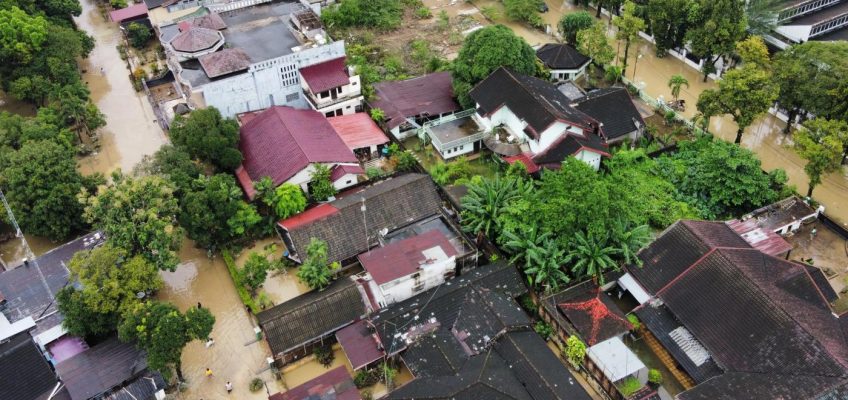By SYLVIE CORBET, Associated Press
PARIS (AP) — Paris’ Louvre museum has approved a ticket hike from 22 to 32 euros ($25 to $37) for non-European visitors from January to help finance an overhaul of the building whose degradation has been exposed by the Oct. 19 crown jewels heist.
Paris prosecutor says arrested man is thought to be 4th member of Louvre heist gang
Sons of Virginia Giuffre, who accused Andrew and Epstein of abuse, seek control of her estate
Pope joins patriarchs from East and West at historic Christian site in Turkey to pray for unity
Death toll rises to 128 in Hong Kong residential fire; 8 more arrested over towers’ renovation
Today in History: November 28, Boston nightclub fire kills 492 people
The measure comes as other major cultural sites across the country, including the Palace of Versailles, are considering similar moves to bring extra money needed for costly maintenance and renovation.
The Louvre ticketing changes come as part of a decade-long plan to modernize the museum. Security breaches that allowed the 88 million-euro ($102 million) theft highlighted the urgency of the situation.
On Friday, a suspect in the Louvre robbery was handed preliminary charges of theft by an organized gang and criminal conspiracy, the Paris prosecutor said Friday, meaning all four alleged members of the team caught on camera stealing the jewels are in custody.
From Jan. 14, nationals from outside the European Union will have to pay 10 euros ($12) more. The measure was approved Thursday by the Louvre governing board. Nationals from Iceland, Liechtenstein and Norway, countries that signed up to the European Economic Area agreement, will be exempted from the hike.
The courtyard and the pyramid of Le Louvre museum are seen Wednesday, Nov. 19, 2025 in Paris. (AP Photo/Christophe Ena)
The Louvre welcomes many international visitors
In 2024, the Louvre welcomed 8.7 millions visitors, 77% of them foreigners. Top nationalities include people from the U.S. (13%), China (6%) and Britain (5%), who will be affected by the price hikes.
Earlier this month, Louvre director Laurence des Cars announced more than 20 emergency measures have started being implemented following the robbery. She said the Louvre’s latest overhaul in the 1980s is now technically obsolete.
The cost for the so-called “Louvre New Renaissance” plan is estimated at up to 800 million euros ($933 million) to modernize infrastructure, ease crowding and give the famed Mona Lisa a dedicated gallery by 2031.
Some have argued that such a policy could be counterproductive if it leads to a fall in the number of visitors. But other institutions see it as a potential solution.
The director of the Chateau de Chambord, one of the most striking chateaus in the Loire Valley, said more money is needed to finance heavy renovation work at his institution.
The Chateau de Chambord decided to apply in January a 10-euro ($12) increase, bringing the ticket to 30 euros ($35) for non-EU residents, who represent about 10% of visitors, director Pierre Dubreuil told local radio Ici Orléans. Money will help finance urgent work to save the crumbling 16th century royal wing of François I from collapsing, with an estimated cost of 37 million euros ($43 million).
“Australians, people from New Zealand, Americans, when they come to see Chambord, sometimes that’s once in a lifetime,” Dubreuil said. “Paying 20 or 30 euros doesn’t change anything.”
The new policy, championed by conservative Culture Minister Rachida Dati, could be extended to other major cultural sites across France. The Palace of Versailles is considering a 3-euro ($3.5) hike for non-EU visitors.
A woman draws in the Richelieu gallery of Le Louvre museum are seen Wednesday, Nov. 19, 2025 in Paris. (AP Photo/Christophe Ena)
Charging foreigners more in the U.S. and Africa
Extra fees for international visitors are not unusual in many countries across the world, often driven by the need to increase revenue to match the costs of maintaining heritage sites.
In the United States, the National Park Service announced this week it is going to start charging the millions of international tourists who visit U.S. parks each year an extra $100 to enter some of the most popular sites, like Yellowstone and Grand Canyon.
The announcement declaring “America-first entry fee policies” comes as national parks deal with the strain of a major staff reduction and severe budget cuts, along with recovering from damage during the recent government shutdown and significant lost revenue due to fees not being collected during that time.
The idea of higher prices for tourists has been debated but not implemented in Britain, where admission to the permanent collections of major museums and galleries is free.
In its budget this week, the U.K. government announced that British cities would be able to levy a “tourist tax” on overnight visitors, similar to fees in cities including Paris and New York. The money would help fund services and infrastructure in the cities.
Charging foreign visitors to major attractions in Africa more than local or regional visitors is common practice across the continent.
Whether it’s a hike to see gorillas or a “Big 5” safari, international visitors to game parks and museums can expect to pay at least four or five times more than residents.
The revenue collected is credited with helping both the local economies and the protection of wildlife. Kruger National park in South Africa charges foreigners $35 a day, but South African residents $8. Masai Mara, Kenya, charges foreigners $200 day, but Kenya residents $24.
AP journalists Andrew Drake and Jill Lawless in London contributed to the story.




